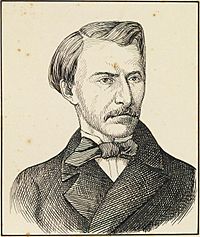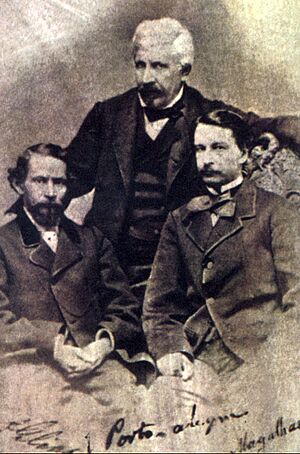Gonçalves de Magalhães, Viscount of Araguaia facts for kids
Quick facts for kids
Gonçalves de Magalhães
|
|
|---|---|

A drawing of Gonçalves de Magalhães
|
|
| Born | Domingos José Gonçalves de Magalhães August 13, 1811 Rio de Janeiro, Colonial Brazil |
| Died | July 10, 1882 (aged 70) Rome, Kingdom of Italy |
| Occupation | Poet, playwright, medician, diplomat |
| Period | 1836–1880 |
| Literary movement | Romanticism |
| Notable works | A Confederação dos Tamoios, Suspiros Poéticos e Saudades, António José, ou O Poeta e a Inquisição |
| Children | Antônio José Gonçalves de Magalhães de Araguaia |
Domingos José Gonçalves de Magalhães (born August 13, 1811 – died July 10, 1882) was an important Brazilian writer. He was a poet, a writer of plays, a doctor, and a diplomat. A diplomat is someone who represents their country in other nations.
He is known for starting the Romanticism movement in Brazilian literature. He also helped create Brazilian theatre. Today, he is honored as the patron of the 9th chair of the Brazilian Academy of Letters. This is a very respected group of writers and scholars.
Contents
About His Life

Domingos José Gonçalves de Magalhães was born in Rio de Janeiro. This city was part of Colonial Brazil at the time. He started studying medicine in 1828 and became a doctor in 1832.
The next year, he traveled to Europe. There, he met Manuel de Araújo Porto-Alegre. He also learned about the new ideas of Romanticism. Romanticism was a big movement in art and literature. It focused on feelings, nature, and imagination.
In 1836, Magalhães wrote an important essay. It was called Discurso Sobre a História da Literatura no Brasil. In the same year, he published a poetry book. This book was called Suspiros Poéticos e Saudades. It was the first Romantic work written by a Brazilian author.
Return to Brazil and New Works
Magalhães came back to Brazil in 1837. He then wrote two sad plays. These were António José, ou O Poeta e a Inquisição (1838) and Olgiato (1839). In 1838, he also became a philosophy teacher. He taught at the Colégio Pedro II.
He also helped start a magazine called Niterói. He worked on it with Porto-Alegre and Francisco de Sales Torres Homem. Only two issues of this magazine were ever published.
Diplomatic Career and Honors
In 1847, Magalhães began a career as a diplomat. He served as a minister for Brazil in many countries. These included the United States, Argentina, Austria, and the Holy See. He also worked as a chargé d'affaires in other places. These included the Kingdom of the Two Sicilies, the Piedmont, Russia, and Spain.
He was highly respected by Emperor Pedro II. The Emperor gave him several important awards. These included the Order of the Rose and the Order of Christ. He also received the Order of the Southern Cross.
In 1872, he was given the title of Baron of Araguaia. Two years later, he became a Viscount.
Magalhães married Januaria de Sa Pinto Ribeiro. He had a son named Antônio José Gonçalves de Magalhães de Araguaia. This son later became a Count of Araguaia.
Domingos José Gonçalves de Magalhães died in Rome on July 10, 1882.
His Main Works
- Discurso Sobre a História da Literatura no Brasil (1836)
- Suspiros Poéticos e Saudades (1836)
- António José, ou O Poeta e a Inquisição (1838)
- Olgiato (1839)
- A Confederação dos Tamoios (1856)
- Os Mistérios (1857)
- Urânia (1862)
- Cânticos Fúnebres (1864)
- Fatos do Espírito Humano (1865)
- A Alma e o Cérebro (1876)
- Comentários e Pensamentos (1880)
See also
 In Spanish: Domingos José Gonçalves de Magalhães para niños
In Spanish: Domingos José Gonçalves de Magalhães para niños
 | Leon Lynch |
 | Milton P. Webster |
 | Ferdinand Smith |

